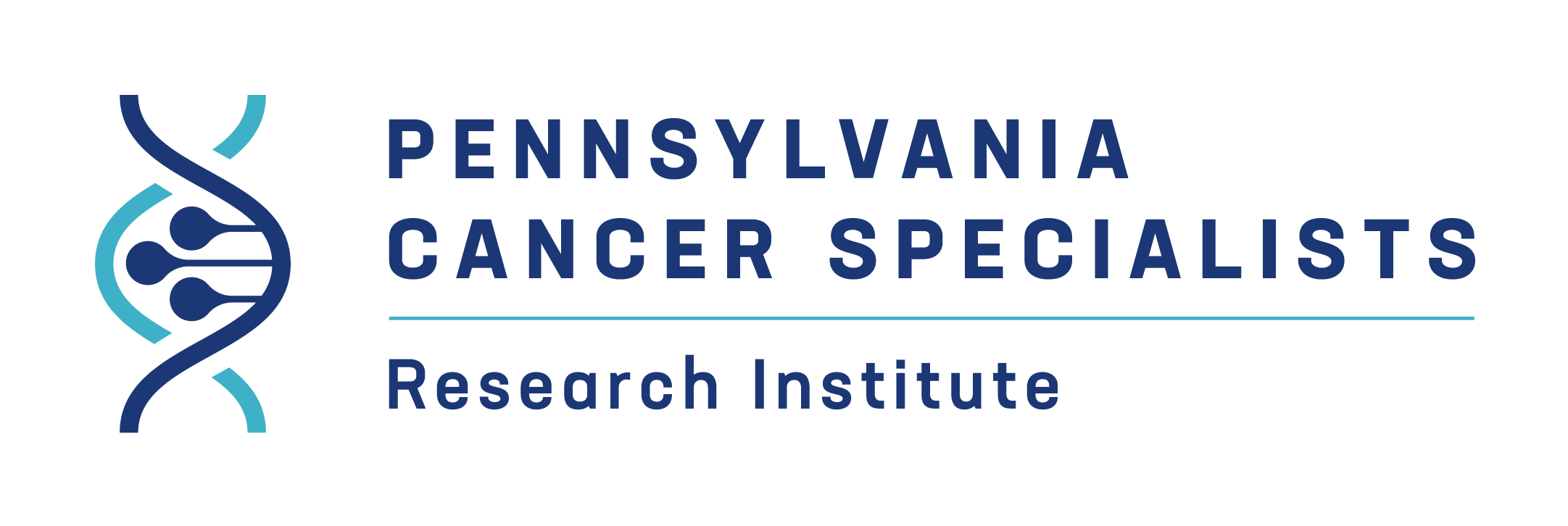Clinical Research
Our Mission
For over a quarter of a century, The Pennsylvania Cancer Specialists & Research Institute has been committed to providing cancer care in a community-based setting close to home. Our all-encompassing oncology and hematology programs provide a complete range of diagnosis, treatment, and follow-up care. Our caring and educated staff remains dedicated to providing insightful, compassionate care to all of our patients. We understand that every person is unique, and we strive to ensure that our patients achieve not only the best possible outcome for their cancer treatment, but also the highest quality care and service during and after treatment. With Medical Oncology, Radiation Oncology, Diagnostic Imaging, as well as an onsite laboratory and pharmacy, we truly offer complete cancer care, under one roof.
PCSRI’s goal of providing the finest quality care would not be complete without clinical research options. Our Clinical Research Department strives to bring future therapies to you now, to benefit you now. We strive to make research opportunities not only available, but understandable. Our staff works directly with participants in our research programs to ensure that the highest quality care is given.
What are Clinical Studies?
Clinical Studies are designed to improve not only the treatment of cancer but improve the quality of life for cancer patients. Clinical research seeks to find better ways to diagnose and prevent cancer and to manage the symptoms of cancer treatment.
Clinical Studies are the final step in a long process beginning in the laboratory leading to FDA approval of new drugs. Research is done in the lab on animals for years before being used with people. The studies lead to new drugs or vaccines, ways to do surgery or give radiation and to test new combinations of treatments.
Why are Clinical Studies Important?
There are new treatments today that were not available to people even just a few years ago. These treatments are the result of clinical research and people participating in clinical studies.
Thanks to the participation of individuals in past cancer studies, doctors have better treatments, better means of determining the best treatment to give and better ways to help manage the care given to cancer patients today.
View Current Clinical Trials
Our staff works directly with participants in our research programs to ensure that the highest quality care is given.
Phases of Clinical Studies
To make new treatment widely accepted (standardized) clinical studies are divided into “Phases” or steps. These steps help identify not just the stage of development of a new treatment but also helps determine when it is safe to give and if it works better than treatments already available.
Phase 1
Purpose: Find a safe dose; decide how the treatment should be given; how the treatment affects the human body and fights cancer. These studies typically involve a small number of people.
Phase 2
Purpose: Determines if the new treatment has an effect on cancer as well as the body and how it fights cancer. More people are enrolled but the numbers are still small, generally less than 100.
Phase 3
Purpose: Compare new treatment with current standard treatment. The numbers of participants are much larger from 100 to several thousand. This is generally the final phase leading to FDA approval
Follow Strict Guidelines
Clinical research studies follow strict guidelines called protocols. This ensures that studies are done in the same manner under the same conditions no matter where it is being conducted. This allows researchers to compare “apples to apples” to determine the effectiveness of a new treatment.
Who can join a clinical study?
Depending upon what the treatment is or what answers are wanted determines who can join the clinical study. Common crieteria for entering include: having a certain type of cancer, what treatments have already been received, having genetic changes in the tumor, age, medical history and current health status.
These conditions help ensure that the same types of people are treated no matter where the study is being conducted and they contribute to patient safety and provides accurate and meaningful study results.
Research Team
Our mission is to improve patient adherence, patient safety, and patient satisfaction on site.
Randomization
Randomization is a process that helps prevent bias. Bias occurs when choices can be affected by people’s emotions, preconceptions or feelings which can affect the outcome of the study. This ensures that unkonwn factors are not introduced which may have unanticipated effects on the study outcome.
Randomization is used in all phases of studies. These decisions are made by a computer or a table of random numbers ensuring that equal numbers of people are assinged to each treatment (Investigational or Control) group in a study.
Investigational groups are those who are assigned to receive treatment that is being studied.
Control groups are those who are assigned the current standard of care. The two groups are then compared at the end of the study to determine the outcome.
Some control groups may receive a placebo instead of the study drug. Placebos are used in some cases when there is no treatment available or when the current standard of care is to wait and watch with no treatment. The placebo-controlled group receive a treatment that looks like and is given the same as the study treatment. This is to prevent bias.
Patient Safety
There are rules in place to ensure that clinical studies are conducted in an ethical manner. Your rights and safety are protected by:
• Informed consent in which every person is informed thoroughly of the study and how it is conducted prior to anything being done.
• During the Informed Consent process conducted by the study doctor and staff you will learn important information to help you decide whether or not you wish to participate.
• You will learn of t estions.
• Careful review and approval by special panels: • Scientific review panel
• Institutional Review Board
Each of these groups examines the clinical study before it can be offered to anyone to ensure it is safe, it is medically sound and ethically conducted. These groups continue to monitor the study as long as it is being conducted. More information on these panels and boards or the Informed Consent process will be provided on request. You will also be given more detailed information if offered a clinical study.
Paying for Clinical Studies
As you consider whether to participate in a clinical study, you need to also consider the cost involved. There can be many costs in the treatment of cancer that include, but are not limited to, doctor visists, hospital stays, standard cancer treatments, treatments to reduce the side effects of treatment, lab tests, and imaging costs. These are patient care costs that can be incurred in any clinical study.
Research costs are those related to the treatment offered in the trial. These costs may include study drug, lab tests performed only for research purposes and additional tests or scans performed solely for research. These costs are most often paid by the study. Sometimes these costs are not covered by insurance but can be covered by the study. Please review the costs of an clinical study before participating. Your research staff will help you with this information.
Deciding to take part in a Clinical Study
As with any decision in life, there are pros and cons to be weighed before deciding. The study staff can help you with this but please ask questions throughout the Informed Consent Process and even beyond if you decide to participate in a study.
PROS
• Clinical studies offer a high-quality cancer care. Even if you are randomized to a placebo or the standard of care treatment, you still receive the best care. This is because there are more people involved providing a very detailed level of care.
• If a new treatment is proven to work and you are receiving it, you may be among the first to benefit.
• By looking at all your treatment options, including clinical trials, your are taking an active role in a decision that affects your life.
• You have the chance to help others and improve care.
CONS
• New treatments under study are not always better than or even as good as standard care.
• If you receive the standard of care instead of the new treatment being tested, it may not be as effective as the new approach.
• New treatments may have side effects that doctors do not expect or that are worse that those of standard treatment.
• Even if a new treatment has benefits, it may not work for you. Even standard treatments, proven effective for many people do not help everyone.
• Health insurance and managed care providers may not cover all patient care costs in a study. What they cover varies by plan and by study. To find out in advance what costs are likely to be covered, check with your insurance company and our billing staff.
Call Us
Gettysburg Cancer Center
(717) 334-4033
Hanover
(717) 698-1564
Adams Diagnostic Imaging
(717) 337-5991


